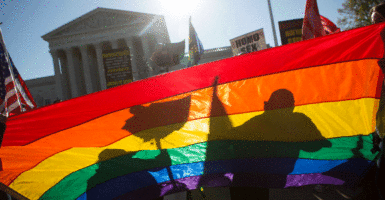Saturday is the six-year anniversary of the Obergefell v. Hodges ruling, in which the Supreme Court redefined marriage to include same-sex couples.
The Supreme Court’s decision has created questions of how it will treat discrimination claims by same-sex couples and supporters of traditional marriage between one man and one woman.
Critics of proponents of traditional marriage erroneously compare them to opponents of interracial marriage.
In his Obergefell v. Hodges dissent, Justice Samuel Alito warned, “Those who cling to old beliefs will be able to whisper their thoughts in the recesses of their homes, but if they repeat those views in public, they will risk being labeled as bigots and treated as such by governments, employers, and schools.”
Nowadays, Alito’s opinion especially rings true for marriage originalists. They are being sued for declining to bake custom wedding cakes and create flower arrangements and calligraphy invitations for same-sex couples.
In his Obergefell v. Hodges dissent, Chief Justice John Roberts predicted these “hard questions,” including what would happen when “a religious adoption agency declines to place children with same-sex married couples.” As a result of the Obergefell v. Hodges decision, this would have to be addressed in court.
On June 17, the Supreme Court answered this particular hard question by ruling in favor of religious liberty and faith-based adoption in Fulton v. City of Philadelphia.
Fulton v. City of Philadelphia dealt with Catholic Social Services, a 2-century-old foster care agency in Philadelphia. Catholic Social Services is one of 30 foster care agencies that has an independent contractor relationship with Philadelphia.
Two years ago, Philadelphia government officials discovered from a newspaper article that Catholic Social Services does not certify same-sex couples because the Catholic Church teaches that every child deserves a mother and a father.
When a same-sex couple would apply to Catholic Social Services to foster a child, Catholic Social Services would refer the couple to other agencies. The petitioners in Fulton v. City of Philadelphia noted that zero same-sex couples have applied to adopt from Catholic Social Services.
After verifying this part of Catholic Social Services’ certification procedure, Philadelphia officials revised its Fair Practices Ordinance on public accommodations to include sexual orientation in the anti-discrimination clause. Officials argued that foster care constitutes a public accommodation despite the fact that foster care is a selective process and not a facility open to the public, like a pool or a gym.
Due to this ordinance, Catholic Social Services could not renew its contract without violating the Catholic Church’s teachings on marriage. The city of Philadelphia, in turn, refused to work with Catholic Social Services or grant an exemption to it, although it granted exemptions for matching children with future parents based on race and disability.
The Supreme Court held that the Philadelphia statute violated the First Amendment and unanimously voted in favor of Catholic Social Services and, as a result, religious freedom.
The Fulton v. City of Philadelphia decision reaffirmed the important distinction made by the majority in Obergefell v. Hodges between opponents of same-sex marriage and interracial marriage.
In Obergefell v. Hodges, Justice Anthony Kennedy wrote that rejecting same-sex marriage based on “decent and honorable religious [and] philosophical premises” should not be “disparaged” due to the First Amendment, the court said no such thing about disagreement with interracial marriage. In fact, the court established in Loving v. Virginia, “[T]here is patently no legitimate overriding purpose independent of invidious racial discrimination.”
As Alito similarly noted in Fulton v. City of Philadelphia, the Supreme Court cannot make such a statement because racism is neither decent nor honorable.
While CSS’s [Catholic Social Services’] ideas about marriage are likely to be objectionable to same-sex couples, lumping those who hold traditional beliefs about marriage together with racial bigots is insulting to those who retain such beliefs.
In Masterpiece Cakeshop v. Colorado Civil Rights Commission, the Supreme Court cautioned against this “undue disrespect to sincere religious beliefs.”
In Obergefell v. Hodges and now in Fulton v. City of Philadelphia, the Supreme Court has stated emphatically that the government should avoid likening support for the original definition of marriage with racism. Rather, the Supreme Court has clearly stated that respect and tolerance should be given to the original view of marriage and those who hold it.
Local and federal governments must remember that the First Amendment cannot be violated simply because people disagree with or are offended by others’ beliefs, including those pertaining to marriage. As Alito stated in Fulton v. City of Philadelphia, “In an open, pluralistic, self-governing society, the expression of an idea cannot be suppressed simply because some find it offensive.”
Defending the freedom to disagree on same-sex marriage benefits qualified faith-based social service providers and the neighbors they serve. The Fulton v. City of Philadelphia decision allows Catholic Social Services to serve many more generations of vulnerable children. Protecting pluralism is the American way.
Have an opinion about this article? To sound off, please email letters@DailySignal.com and we’ll consider publishing your edited remarks in our regular “We Hear You” feature. Remember to include the URL or headline of the article plus your name and town and/or state.





























